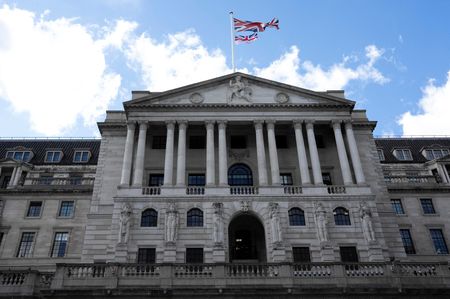By David Milliken and Lawrence White
LONDON, July 9 (Reuters) – Risks to financial markets remain high despite an easing of tensions after the United States paused implementing tariffs announced in April, the Bank of England said on Wednesday.
The British central bank said it continued to see dangers from “geopolitical tensions, global fragmentation of trade and financial markets and pressures on sovereign debt” in a half-yearly assessment of threats to financial stability.
“The risk of sharp falls in risky asset prices, abrupt shifts in asset allocation and a more prolonged breakdown in historical correlations remains high,” the BoE’s Financial Policy Committee said.
Global share prices tumbled at the start of April and British 30-year government borrowing costs rose to their highest since the late 1990s after President Donald Trump announced wide-ranging tariffs on exports to the United States.
While share prices have largely recovered, bond markets remain nervous about the scale of future borrowing possible in the United States, Britain and elsewhere.
Last week British bond prices fell sharply after the government had to scale back plans to cut welfare payments in the face of parliamentary opposition and doubts briefly swirled about the future of finance minister Rachel Reeves.
On Tuesday, Britain’s Office for Budget Responsibility described the country’s public finances as being in a “relatively vulnerable position” after the COVID-19 pandemic and that the government had failed to scale back spending since.
The BoE said Britain’s government bond market had functioned efficiently during market tension in April, but noted that the external stress was relatively short-lived.
“Conditions might have become more strained had the episode of volatility lasted longer,” the BoE said.
The central bank said it was releasing more data on aggregate market positions so firms could better guard against risks.
British households and businesses overall remained resilient and the domestic banking system was well placed to keep lending even if there was a sharp economic deterioration, it said.
As a result, there were no domestic reasons to change the counter-cyclical capital buffer from 2%, the FPC said. The CCyB is varied over the credit cycle to ensure banks build up a cushion against future losses during good times and are able to keep lending during a downturn.
(Reporting by David Milliken and Lawrence White)
((david.milliken@thomsonreuters.com; +44 20 7513 4034))
Keywords: BRITAIN BOE/










